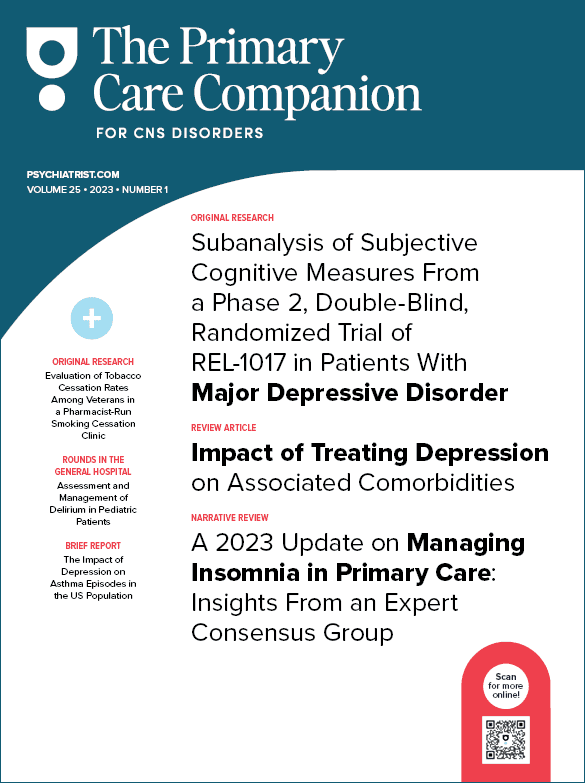
A New Era of Collaboration for Primary Care and Psychiatry
The year 2014 heralds the start of a new era for primary care and psychiatric practice. The Primary Care Companion for CNS Disorders will continue to provide the information required to excel in this new era. Implementation of the Affordable Care Act, finalization of the rules guiding mental health parity, and the emergence of accountable care organizations and patient-centered medical homes all contribute to the framework for practice in this new era. However, professional expertise, particularly at the interface of primary care and psychiatric practice, is required.
These developments contribute the impetus as well as the means to significantly improve the care we provide our patients. The Affordable Care Act, with its expansion of coverage and restrictions on the ability of insurers to cherry-pick or dump patients for profit, will engage many individuals who historically have been disenfranchised and unable to access long-term quality primary and mental health care. Mental health parity will foster access and provide financial support to treat this population. Consequently, systems that historically have dealt with those individuals with significant psychiatric and medical comorbidities by carving them out or excluding them will instead need to develop the capacity to provide them effective care. Accountable care organizations provide the scale necessary for health care professionals to accept responsibility for the health care and related outcomes of the populations that enroll with them. Patient-centered medical homes provide the local environment to deliver competent personalized care that integrates across medical and psychiatric conditions.
Medical and psychiatric comorbidities are highly represented in patients who historically have been disenfranchised and who are high cost to society in terms of direct medical expenditures, lost productivity, and toll on families. In concert with specialty psychiatric care through the linkage provided by accountable care organizations, the patient-centered medical home model provides a mechanism with the potential to make a difference in the lives of such patients.
However, in addition to the organizational and financial changes reviewed above, 2 critical professional concerns must be recognized. The patient-centered medical home replaces care by individual primary care physicians with care by teams inclusive of behavioral health and care management expertise. The first concern is that to be successful these teams must be robust enough to reliably deliver high-quality services that recognize and engage those with psychiatric conditions. The teams must then as a routine provide effective care, managing both psychiatric and medical conditions of not only individual patients but also the populations for which the teams are responsible. This requires that the teams’ psychiatric professionals be skilled in evidence-based treatment approaches and have the time and administrative support to deliver such therapies with fidelity.
A major transition is currently underway in the behavioral health field as many of its professionals move to employment in systems that can integrate their skills into the insurance, accountable care organization, and patient-centered medical home framework of health care that is emerging. Those health care systems that seek short-term savings by staffing with low-skilled behavioral staff or by providing such staff with unrealistic workloads and inadequate support are doomed in the long-term, as bills for avoidable high-cost emergency and hospital services of enrolled patients accumulate. Quality contracting, of which behavioral health measures are key performance criteria, will further enforce the value of a highly competent interdisciplinary team.
A second concern relates to the competence of the primary care physician. There is great variability in the psychiatric skills of members of the primary care work force. Medical schools often place a low priority on learning the pathophysiology, diagnosis, and principles underlying effective care of psychiatric conditions. Residency training also is highly variable, with only some disciplines and programs excelling at fostering the required behavioral health clinical skills. As a consequence, primary care physicians entering practice range from those with the foundation to be effective primary care physician members of patient-centered medical home teams to those facing a steep on-the-job learning curve.
I do not envision primary care physicians becoming “mini-psychiatrists.” However, they do need to develop skill in working with their teams to manage a large portion of common psychiatric illness, including long-term maintenance and monitoring. To be successful, teams must work closely with specialty providers to develop effective “warm-handoff” strategies. Patients with severe or complex acute illness and exacerbations must reliably receive prompt specialty psychiatric care during episodes and reliably be transferred back to the patient-centered medical home team when stable; this will require both “step-up” and “step-down” arrangements. This strategy will assist professionals in specialty practice settings by allowing them to focus on patients who can benefit most from that level of care. Geography and clinician distribution are very likely to lead to a wide range of distribution of workload between patient-centered medical homes and specialty care. Patients will benefit from the ability of patient-centered medical homes to integrate the care of all of their chronic conditions over time, hopefully reducing the large disparity in death and disability from medical conditions among those with serious psychiatric disease.
The Primary Care Companion for CNS Disorders seeks to provide a breadth of opportunities for primary care physicians and other related professionals, ranging from brief case-based education and insights about how other practices approach care to in-depth reviews of key topics and original research. We seek submissions from our readership, since, in primary care, our practices are also our laboratories. The sharing of best practices, including through the Companion, is critical to our being able to meet the complex medical and behavioral needs of our patients in the new era we are entering. The international nature of both our authors and readership supports the sharing of best practices and new clinical insights between disciplines and across borders.
Annually, we recognize the outstanding contribution of our reviewers. Their skill in evaluating manuscripts and providing excellent feedback to authors is an often unrecognized contribution of time and expertise. As editor in chief, I daily see the very positive impact of reviewers on final articles. My thanks, and the thanks of our readers, go out to them.
Reviewers for The Primary Care Companion for CNS Disorders
January 1, 2013-December 31, 2013
Anwar K. Abdullah, MD
Abdulkader Alam, MD
Yakup Albayrak, MD
Mohammad Alsuwaidan, MD
Donna Ames, MD
Ion-George Anghelescu, MD
Robert L. Barkin, MBA, PharmD, NHA
Rahul Subramanian Bharadwaj, MD
Robert S. Biskin, MD
Cecilia Björkelund, MD, PhD
Tom Burns, CBE, DSc
Andrew M. Busch, PhD
David J. Castle, MD
Joseph M. Cerimele, MD
Eva Ceskova, MD
Michelle D. Colvard, PharmD
Rochellys Diaz Heijtz, PhD
Julie Ann Dopheide, PharmD, BCPP
Alaa Elhaj, MD
Abimbola Farinde, PharmD
George A. Gaither, PhD
Prashant Gajwani, MD
Anna Glezer, MD
David W. Goodman, MD
Anne F. Gross, MD
Elaine Henna, MD
Tom Janzen, MD
Anita S. Kablinger, MD
Arif Khan, MD
Imran S. Khawaja, MD
Venkata Kolli, MBBS
Ian M. Kronish, MD
Jens M. Langosch, MD, PhD
E. David Leonardo, MD, PhD
Robert D. Levitan, MD
Alfred J. Lewy, MD, PhD
J. Sloan Manning, MD
Peter Manu, MD
Alina Marin, MD, PhD
Prakash S. Masand, MD
W. Vaughn McCall, MD
Robert M. McCarron, MD
Robert E. McCue, MD
Terry A. McInnis, MD, MPH
Benjamin F. Miller, PsyD
C. Brendan Montano, MD
Kathleen G. Nadeau, PhD
Meera Narasimhan, MD
J. Craig Nelson, MD
Claus Normann, MD
Kevin Nugent, MD
Tina Marie Oakes, PhD
Christine M. Peat, PhD
Roger Peele, MD
Valdo Ricca, MD
Gary S. Sachs, MD
Lampros Samartzis, MD
Gianluca Serafini, MD
Winston W. Shen, MD
Linda M. Strand, PharmD, PhD
Chao-Sueh Su, MD
Jaana M. Suvisaari, MD, PhD
Marvin S. Swartz, MD
Bryan K. Touchet, MD
Ryan J. Van Lieshout, MD, PhD
Benjamin Van Voorhees, MD, MPH
W. Victor R. Vieweg, MD
Boris Voinov, MD
Thomas E. Wasser, PhD
Toni Terling Watt, PhD
Risa B. Weisberg, PhD
Richard H. Weisler, MD
Joseph J. Westermeyer, MD, PhD
Michael W. Wiederman, PhD
Glen Lin Xiong, MD
Barbara P. Yawn, MD




